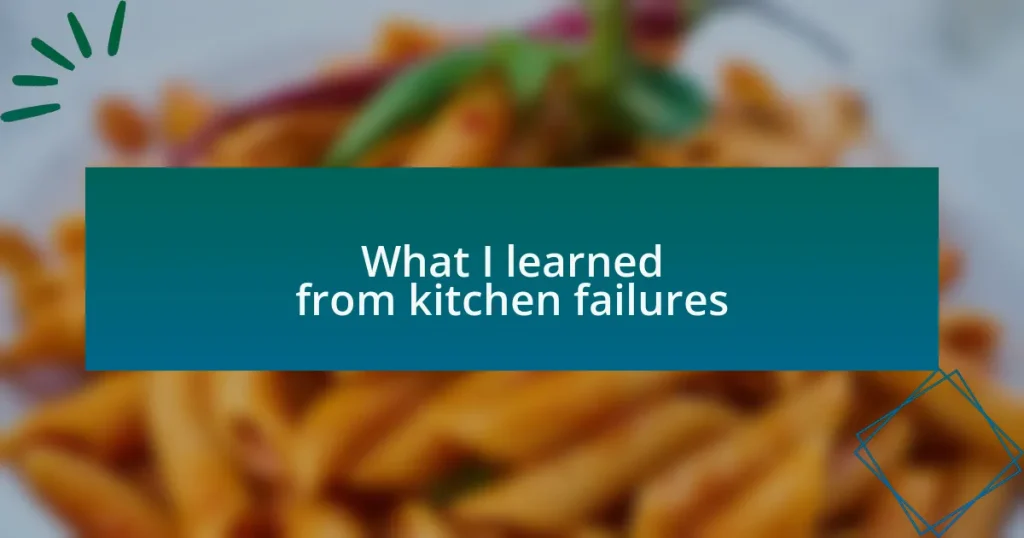Key takeaways:
- Kitchen failures are valuable learning experiences that encourage resilience and creativity in cooking.
- Understanding ingredient interactions and cooking techniques is essential to avoid common mistakes and improve culinary skills.
- Preparation and organization, such as mise en place, are key to successful cooking and minimizing stress.
- Embracing failures can lead to growth, innovation, and stronger connections with others through shared experiences.
Author: Evelyn Harrington
Bio: Evelyn Harrington is an acclaimed author known for her evocative storytelling and intricate character development. With a background in literature and creative writing, she has published several best-selling novels that explore themes of resilience and identity. Her work has garnered numerous awards, including the prestigious Waverly Prize for Fiction. When she’s not writing, Evelyn enjoys hiking the scenic trails of her hometown and engaging with her readers through her popular blog. She currently resides in Portland, Oregon, where she continues to craft compelling narratives that resonate with audiences worldwide.
Understanding kitchen failures
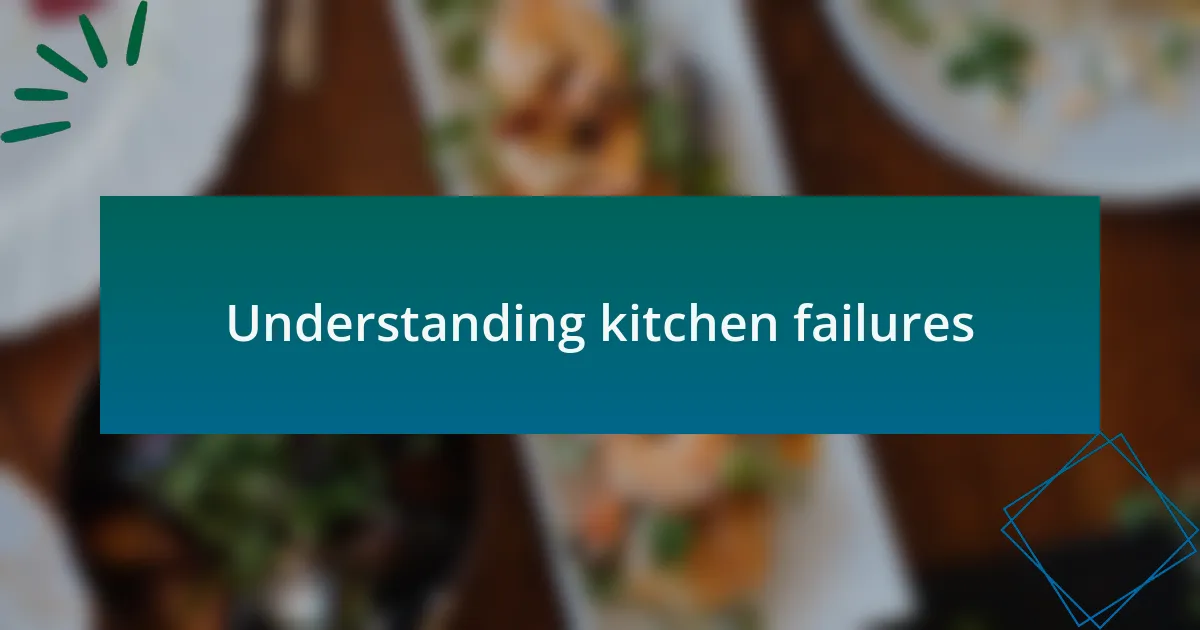
Kitchen failures are an inevitable part of the culinary journey. I remember my first attempt at making soufflés; it was a puffed-up disaster that fell flat before it even reached the oven. How can something so elegant turn from a beautiful dream into a soggy memory? It’s moments like these that remind us that cooking is as much about learning from our mistakes as it is about perfecting our skills.
Each failure offers a lesson wrapped in disappointment. For instance, my misadventures with pastry taught me the importance of precision. I recall rolling dough that refused to cooperate, leading me to ponder: was it the temperature, the technique, or simply my impatience? Reflecting on these instances, I realized that a little mindfulness can transform frustration into growth.
Every time I face a culinary setback, it stirs a mix of emotions—frustration, embarrassment, but sometimes even laughter. I often ask myself, can these moments be the real spice of life in the kitchen? Absolutely. They push us to try again, explore new methods, and build resilience. Ultimately, kitchen failures become stepping stones on our path towards delicious successes.
Lessons from the kitchen
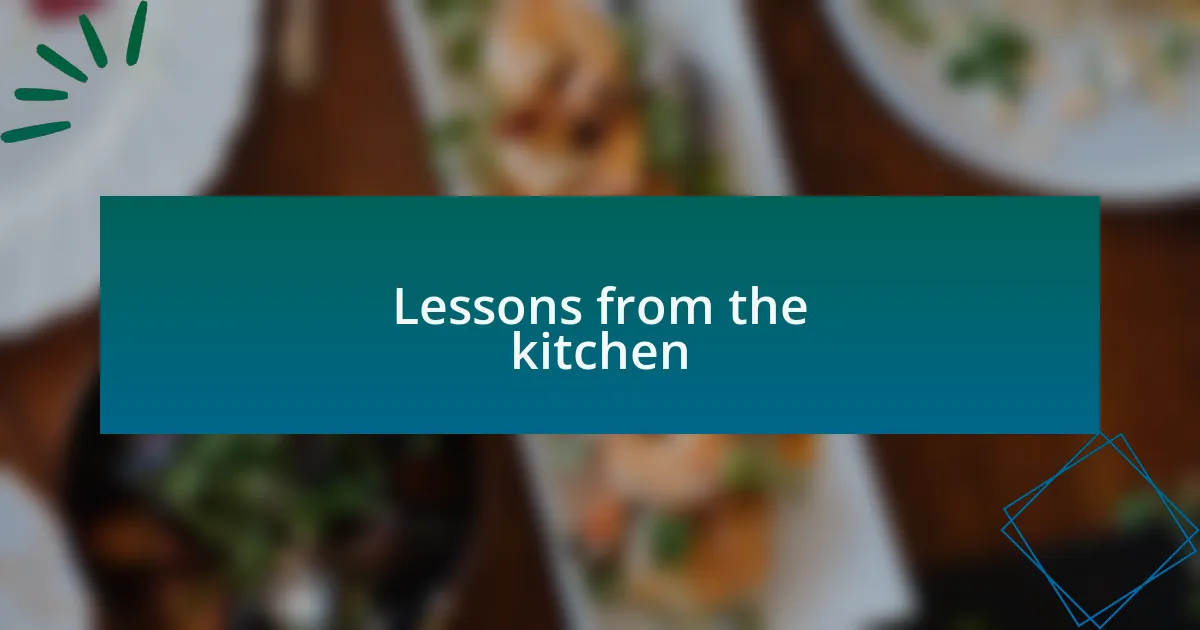
Kitchen failures have truly been my most reliable teachers. I once attempted a complex risotto that turned into a gluey mass instead of the creamy delight I envisioned. Watching that pot bubble away made me question my culinary judgment. Was I too eager to impress? From that failure, I learned the value of patience; good things really do take time, especially in cooking.
There was a time when my bread didn’t rise—not even the tiniest bit. As I stared at the dense loaf, I couldn’t help but chuckle at my own hubris. I had skipped the crucial step of checking the yeast’s freshness, which became a lesson in humility. I now check each ingredient thoroughly, reminding myself that even the smallest oversight can lead to a culinary catastrophe.
Reflecting on my kitchen mishaps, I realize they often sparked creative solutions. After burning a batch of chicken, I experimented with new marinades and discovered flavors I never would have otherwise. Isn’t it fascinating how failure can lead to a breakthrough? These experiences taught me that an open mind and a willingness to adapt can turn kitchen disasters into delicious surprises.
Common mistakes in cooking
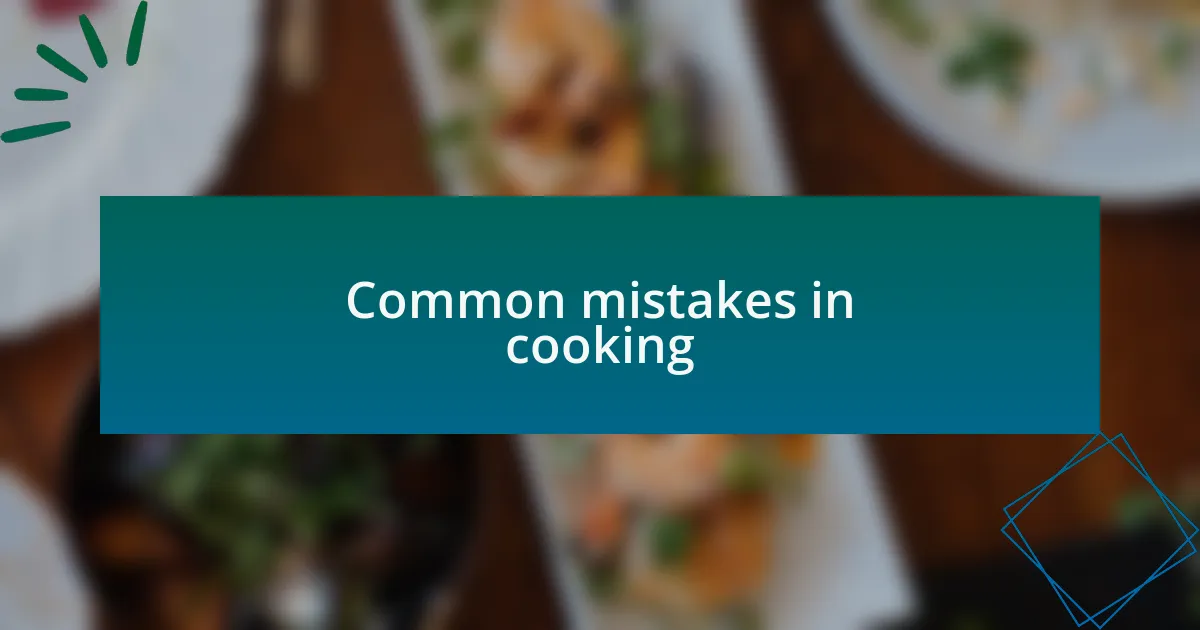
Cooking mistakes can be surprisingly revealing. I once thought I could substitute salt with sugar in a soup, convinced that it would enhance the flavor. Instead, I ended up with a sweet, inedible concoction that tasted more like dessert than dinner. This taught me the importance of understanding flavor profiles and how certain ingredients react with one another—something I now consider vital before I even begin a recipe.
Overcooking vegetables is another common pitfall I’ve encountered. I remember the first time I tried to sauté asparagus, hoping to achieve that vibrant green with a slight crunch. Instead, I was left with limp, colorless spears that tasted more like mush than fresh produce. This failure highlighted the importance of timing and constant attention. Now, I remind myself to stay engaged during cooking—it’s amazing how a minute can change everything.
Measurements can feel tedious, but they are foundational to successful cooking. I once misread a recipe and dumped in three tablespoons of oil instead of the intended three teaspoons. The resulting dish was greasy and uninspired. That event was a wake-up call about the need for precision in cooking. It underscored the fact that even small changes can dramatically alter a dish’s integrity, leading to an outcome far from what you envisioned.
How to improve cooking skills
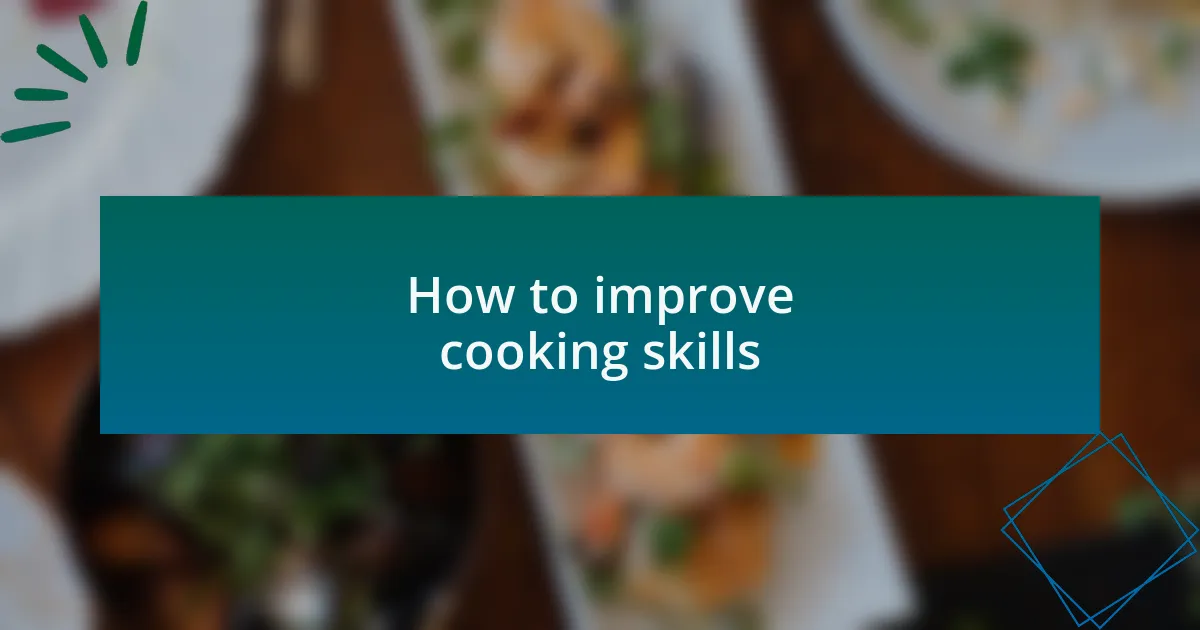
To truly improve your cooking skills, practice is essential. I often find myself reflecting on the time I hosted a dinner for friends, determined to impress. Unfortunately, I couldn’t quite nail the roasted chicken, which ended up dry and bland. That experience drove home the point: the more you cook, the more you’ll learn what works and what doesn’t. Each meal is an opportunity for growth.
I also recommend experimenting with various cooking techniques. One evening, I decided to challenge myself with a technique I had never tried before: sous vide. Although my first attempt produced a steak that was more gray than golden brown, I learned so much about cooking times and temperatures. It made me realize the importance of being open to new methods and not being afraid to fail in the process.
Moreover, seeking feedback from others can be incredibly valuable. After that dinner party, I asked my friends for honest opinions on the meal, even though I dreaded the criticism. Surprisingly, their insights helped me identify areas to improve, like seasoning and presentation. Have you ever considered that listening to others might be the key to elevating your skills? Taking constructive criticism to heart can lead to remarkable improvements in your cooking journey.
Personal experiences with kitchen failures
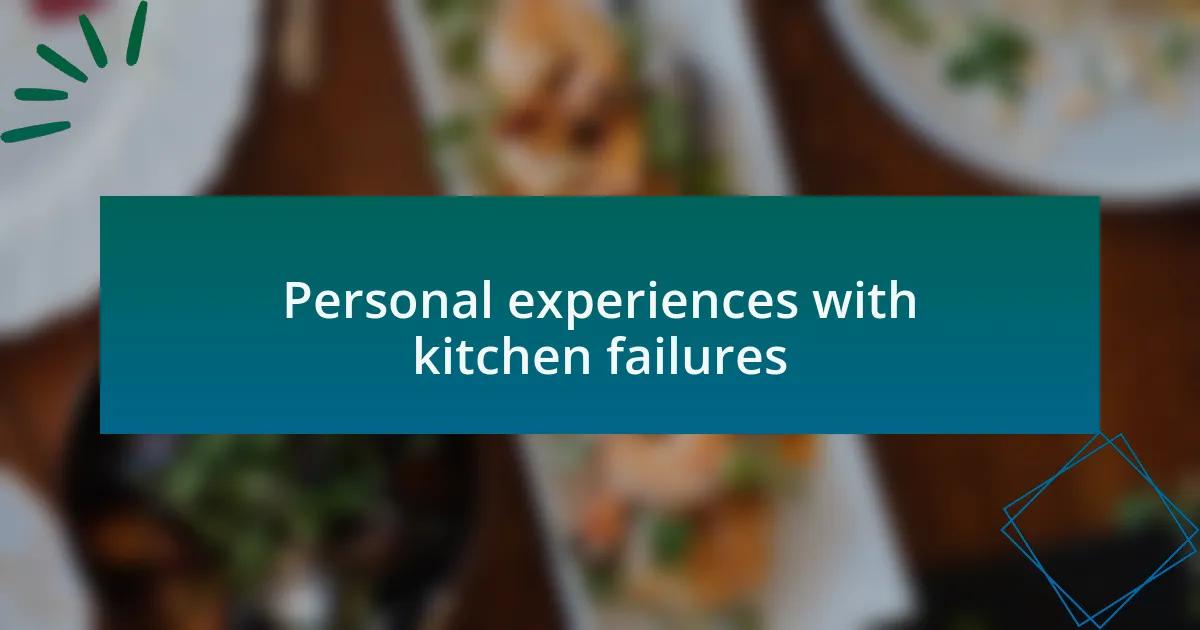
I remember a time when I attempted to bake a soufflé for a special occasion. I followed the recipe meticulously, but when it came out of the oven, it collapsed within minutes. I felt a wave of disappointment wash over me, not just because of the result, but because I had put my heart into it. That failure taught me the delicate balance of precision and patience required in baking, along with the lesson that sometimes, the most beautiful moments in cooking lie in the imperfections.
Another memorable mishap was when I tried my hand at homemade pasta. The dough was a sticky mess, adhering to everything except the rolling pin. I laughed at my efforts as I struggled to scrape it off the counter, realizing that I had underestimated the process. It was a humbling experience, but it also sparked a curiosity about why the pasta-making process is so intricate and what techniques I could master to avoid similar disasters next time.
One of the most eye-opening experiences came when I made a traditional British curry for a food-tasting event. In my enthusiasm, I over-spiced the dish, aiming for bold flavors that turned out to be overwhelmingly hot. The look on my friends’ faces as they tried to hide their discomfort was priceless. That night taught me a vital lesson: flavor balance is key. How often do we overlook the power of subtlety in cooking? I learned to approach seasoning with a more thoughtful perspective, recognizing that sometimes less truly is more.
Tips for avoiding kitchen pitfalls
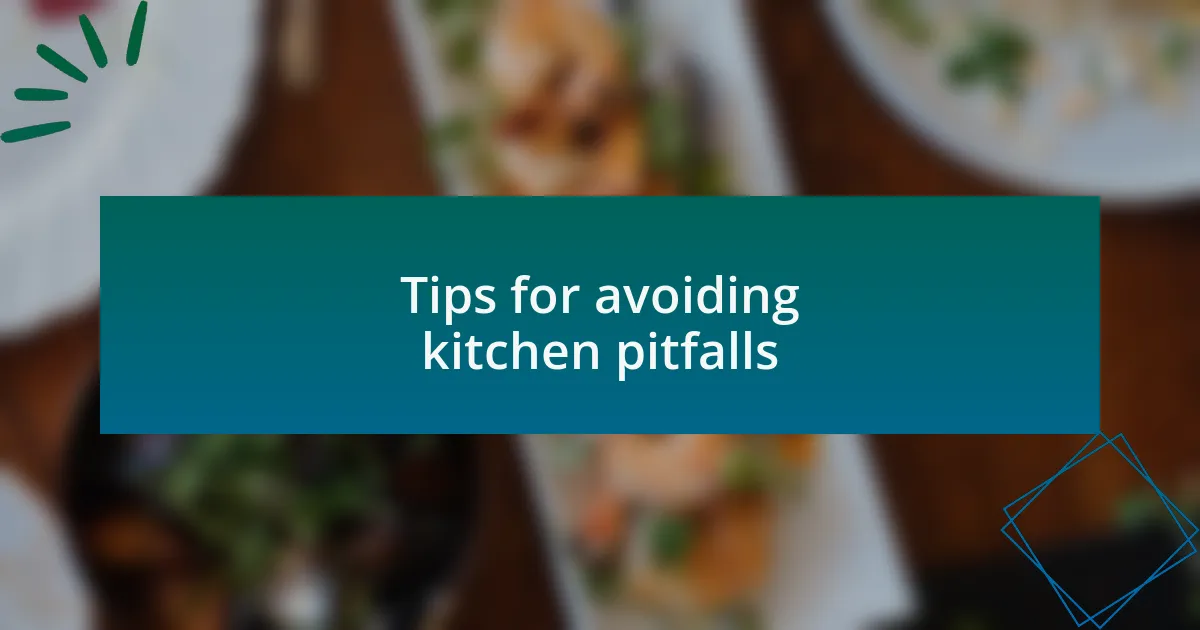
It helps to be prepared before stepping into the kitchen. I remember one evening when I decided to whip up a quick dinner without checking my pantry first. When the time came to cook, I was missing critical ingredients, which led to a haphazard meal. This taught me the importance of keeping an organized kitchen and always double-checking supplies before I start. How often do we overlook a simple step like this?
Another tip I’ve gathered from my missteps is to embrace the power of mise en place, a French term meaning “everything in its place.” During one chaotic cooking session, I found myself scrambling as I searched for ingredients while my dish was cooking. I realized that pre-measuring and preparing the components not only boosts efficiency but also reduces stress. Have you ever felt overwhelmed while cooking? It’s amazing how a little organization can transform the experience into one that flows more smoothly.
Lastly, don’t hesitate to start small, especially when trying new techniques. I took on an ambitious project one weekend, attempting a complex dessert that I hadn’t yet mastered, which ended in disaster. The experience left me more discouraged than I anticipated. I soon learned to break down more challenging recipes into manageable parts, allowing for mistakes at each stage. Isn’t it empowering to know that we can learn and grow from our kitchen journeys, one small step at a time?
Embracing success after failure
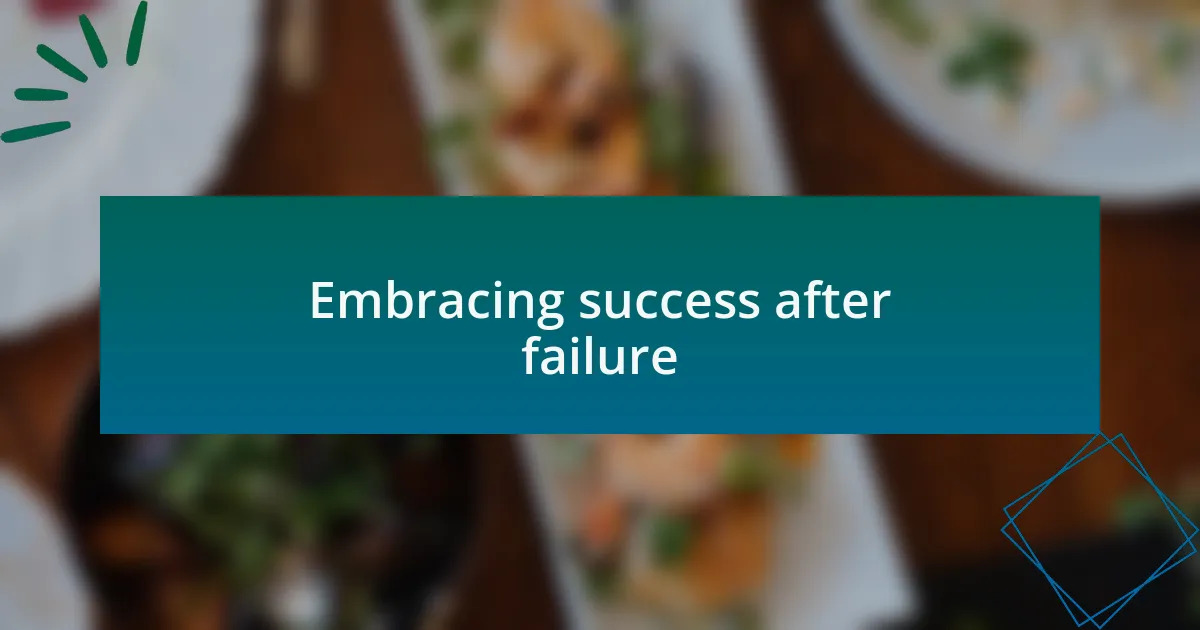
Embracing success after failure is an essential part of my culinary journey. I vividly recall a time when a soufflé I was so proud of collapsed right before serving. Instead of succumbing to disappointment, I embraced the moment as a learning opportunity, exploring what might have gone wrong. Have you ever taken a misstep and turned it into a stepping stone? That experience led me to appreciate the delicate nature of cooking and reinforced my commitment to understanding the science behind it.
One day, while experimenting with flavors, I mixed ingredients that clashed disastrously—what I thought would be a savory sauce turned out almost inedible. Initially, I was frustrated, but I used it as motivation to research flavor profiles and experiment further. This failure fueled my creativity and led to some of my best dishes. Isn’t it fascinating how moments of trial can open our eyes to new possibilities? I now see failures as invitations to think outside the box, igniting my passion in the kitchen.
Embracing success after failure often means sharing those journey stories with others. I remember inviting friends over for a dinner party, during which I proudly showcased my culinary experiments. When they asked about the unexpected flavors in a dish, I laughed and revealed the culinary mishaps that had led me there. It created a sense of camaraderie, reminding us all that we’re in this together—failures included. How often do we miss the chance to connect with others through our kitchen challenges? Sharing these experiences can turn kitchen flops into laughs, building not just skills but also relationships.
